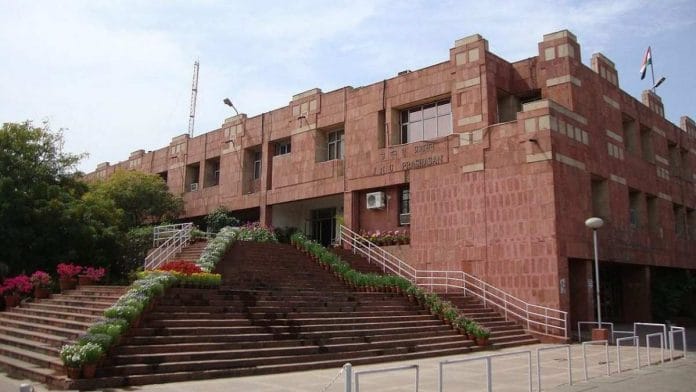It seems there is an unwritten covenant that anything that happens in the outstandingly erudite precincts of the Jawaharlal Nehru University must pass through the acid test of controversy. The JNU academic council is introducing a course on ‘Counter Terrorism, Asymmetric Conflicts and Strategies for Cooperation among Major Powers’. It is meant to be taught as a subject to engineering students with an objective of giving them an in-depth understanding on the challenges emanating from terrorism to national security.
The course will also try to inform students about the need to think of ways and means to use science and technology that would allow India to equip itself with adequate responses in case of any eventuality. This JNU course will actually inform the students of the availability of vast and newer domains of application area for their knowledge.
A growing trend
The trend in a number of higher education institutions is to provide holistic education to students in science, technology, engineering, and medical (STEM) streams and expose them to subjects related to humanities such as diaspora studies, issues concerning displaced persons, emerging flashpoints, conflict situations and many such subjects that may not directly come anywhere close to science and technology syllabi.
Massachusetts Institute of Technology (MIT) in the US conducts a joint programme consisting of subjects from humanities and science so as to expose the student to broader stream of knowledge. While the student pursues a science and technology course seriously, the benefits of understanding and becoming aware of global affairs that concern one and all in day-to-day life are not denied to the student.
There is a consensus among security and strategic experts on the increasing extent of terrorism influencing the dynamics of geopolitics not only in India’s neighbourhood but in other parts of the globe as well. The US’ re-entry in Afghanistan was prompted by the 9/11 terror attacks. The subsequent “war on terrorism” had two important elements – religious template of terrorism and the use of technology, at times fairly advanced, by both sides.
Compared to this, terror outfits in Africa like the Boko Haram are not known to use advanced technology and respective governments are even slower in adopting technology to counter terrorist activities.
Counter-terrorism requires use of advanced technology to gather information, collect intelligence inputs, analyse and use appropriate technical solutions in the best possible manner. An engineer entrusted with such a task is expected to have basic knowledge of the objectives of terror outfits and the methodologies they adopt to further their sinister agenda.
It is nobody’s argument that a university-level engineering curriculum should include controversial issues not directly related to the vocation of the student. But a minimum exposure to the various conventional and non-conventional threat perceptions that we are facing in the current context is something that will add value to the output of the student.
Over the years, threats to national security are emanating from several sources and in manifold forms. The traditional modus operandi of terrorism involves using the most advanced technologies, based in and operated from different countries and continents. The perpetrators of terrorism are sometimes much ahead of their targets, public or governments, in the use of technology. Such a situation calls for greater understanding, cooperation and coordination among nations and put in place a collective solution.
Also read: In JNU, works of Gail Omvedt and Dalit scholars are relegated to ‘underground’ networks
It’s not ‘communalising education’
According to those part of the curriculum and imparting the course in JNU, the chapter seeks to trace the origin of various forms of terrorism and terror outfits, including the jihadi terrorism manifested through the Taliban and other associated outfits. Prof Arvind Kumar, who has a long experience in National Institute of Advanced Studies (NIAS), has developed the course material on the basis of similar courses in a number of universities abroad.
Many advanced economies as well as emerging economies are facing the problem of economic disruption by terror elements, which are oriented in religious fundamentalism and misinterpretation of religious tenets for nefarious activities. Incidentally, a number of these mercenary outfits are also seen to enjoy patronage by political establishments, rouge armies and theocratic political dispensations.
The ministry of education and other pedagogy bodies like the University Grants Commission (UGC) should take a cue from the JNU and consider evolving a fool-proof methodology to integrate STEM courses with credits in liberal arts, literature and humanities so as to equip students with enough all-round knowledge to face the real world after graduation.
In the current educational system, STEM education and pure sciences courses have no content that links to philosophy, history or metaphysics. Over the years, society has got into a rat race of producing engineers and doctors on the one side and students of arts and humanities on the other, both considering one another as aliens. The job market and income brackets have become the final arbitrators of the course of education.
Engineering institutes in India like the Indian Institute of Technology require only 4.5 per cent of credits from humanities and social sciences courses for a student pursuing computer science. Compared to this, a similar course in a foreign university demands a 20 per cent credit points. No doubt, they produce better-equipped citizens with a much wider worldview even as we boast of a robust educational system. Instead of running it down as ‘communalising education’, the JNU experiment should be understood, analysed, edited if necessary, and replicated in other universities across India.
Seshadri Chari is the former editor of ‘Organiser’. He tweets @seshadrichari. Views are personal.
(Edited by Prashant Dixit)






